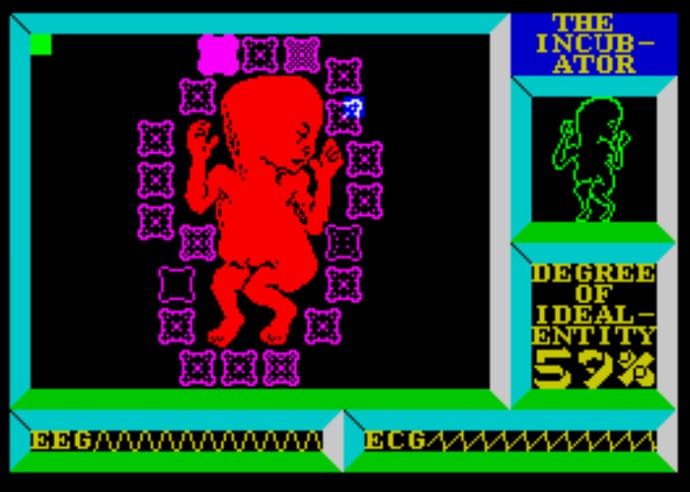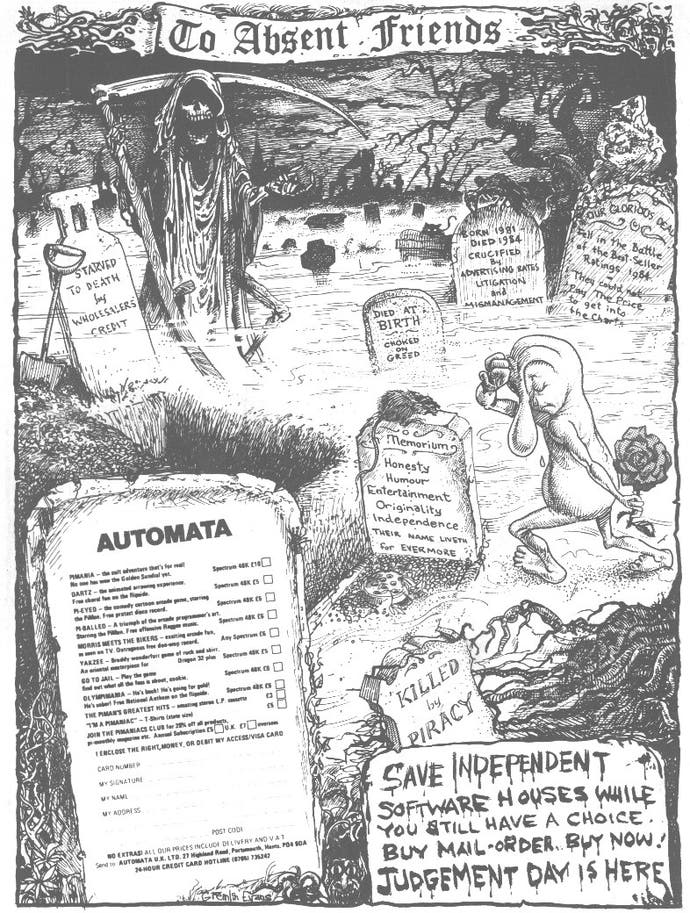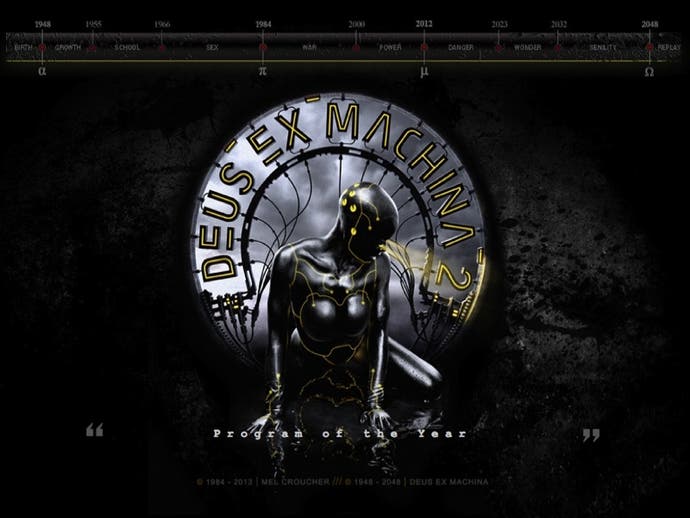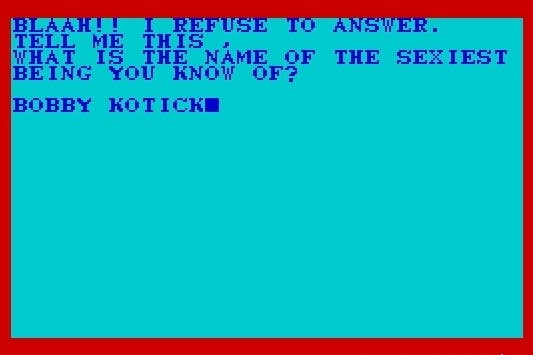Code Britannia: Mel Croucher
The 8-bit Frank Zappa on nostalgia, crowd funding and his long awaited return to the games industry.
Mel Croucher's name comes up rather a lot, although not generally in everyday conversation. He's rarely listed alongside the giants of game design, nor are his games likely to elicit much recognition from anyone other than the most devoted 8-bit retro nut. Talk to any of the developers who were around at the same time, however, and his name is like catnip. Most hail him as an inspiration. Some even go that little bit further and use the word "hero".
Once you consider his bizarre and often angular career, it's easy to see why. Croucher is the developer who did it his way, unfettered by the demands of genre or sales, and he washed his hands of games entirely once encroaching corporate influences made that impossible. This was the man who, rather than making a nice safe platform game about a cartoon animal, would instead opt to make an epic exploration of life and death, told from the perspective of an organism growing inside a computer, formed from a glitch caused by the poo of the last mouse on Earth.
That game was Deus Ex Machina, the computer game equivalent of a concept album, with an accompanying soundtrack tape that had to be synced up with the gameplay, containing a carefully timed compilation of music tracks and voice performances from the likes of Jon Pertwee, Ian Dury and Frankie Howerd. Not only had gamers in 1984 never seen, heard or played anything like it, there's not really been anything like it since.
That is, until now. After walking away from games three decades ago, Croucher reformed his software company Automata last year and announced a slew of new games, including Deus Ex Machina 2.
"Over the years a hell of a lot of people have asked me to get back in, usually to front something, or back something, and I have refused for a number of reasons," he explains. What lured him back was a lunchtime conversation with his former Automata colleagues, including Andy Stagg, the original programmer of Deus Ex Machina. "Instead of droning on and moaning on about the state of things in the games business, we were all saying that after years of dross and corporate idiocy, the current climate feels just like it did back in the early 80s, where anything is possible and where it's possible to have some fun."
"After years of dross and corporate idiocy, the current climate feels just like it did back in the early 80s, where anything is possible and where it's possible to have some fun."

Eventually, it was Karl Jeffery, now chairman of Climax and a long time friend, who suggested Croucher revive Automata. "We did it there and then," says Croucher, and it doesn't sound like his intentions have softened with age. "Question the norms, ignore the mainstream, two fingers up to the sceptics, provoke and entertain," he declares of his design manifesto. "The only difference now is that there is a potential audience of tens of millions not tens of thousands, and I'm not particularly interested in provoking and entertaining kids any more. I want to reach out to new demographics, including the old. And lovers of naked, hermaphrodite, bald, fat bastard avatars, of course."
That would be PiMan, the curious long-nosed Automata mascot who appeared in the company's memorable magazine adverts - little self-contained underground comic strips that felt like they belonged in some musty acid-rock fanzine - and inspired songs on the B-side of the game cassettes. In his most infamous stunt, Croucher announced that the first person to solve the riddle at the heart of 1982 game PiMania would be given a golden sundial, but only if they turned up at a secret location based on a clue given at the game's end. It took three years for someone to crack it, which rather puts Curiosity's tap-a-thon into perspective.
"Aha!" Croucher exclaims. "Old Molyneux certainly echoes PiMania a little, but his Curiosity is way ahead of the sort of thing I was doing: as it should be, given the technology and the player base". It's perhaps no surprise to learn that similar ideas had occurred to Croucher back in the 1980s.
"I did toy with a prize that really was 'life changing' for a sequel to Groucho," he admits, referring to the fantastically named 1983 game My Name is Uncle Groucho and You Win a Fat Cigar. "But when I got into the notion of providing housing, warmth, food, education, and everything up to a funeral plan, it all seemed a bit sick. Better to give that sort of thing to people who really need it, not leave it to the playing of a video game."
Many of Automata's experimental projects would now be classed as "augmented reality" or "transmedia", and its more ambitious titles are often cited in support of the "games as art" argument. It's notable that, to Croucher, they were never simply games, but wide-reaching entertainment endeavours of which games were just a part.

"I never knew any better!" he laughs. "All the multimedia stuff seemed very natural to me when I first did it. Remember, PiMania involved a game, a rock album, a weekly cartoon strip, a social network of PiManiacs and a hidden treasure out there in the real world." He seems to love blurring the lines, I suggest. "There may be a lot of lines involved," he replies, "but they're not blurred. They twist together like a rope to make everything mutually supportive."
For all the talk of how influential Croucher's outsider art was, he sees precious little evidence of it today. "I wish lots of creatives were making interactive movies that provoke genuine emotion, but I think those who are treading a similar path to the one I laid down have found their way on their own, and not with my stuff as a roadmap. A lot of today's movers and shakers who are now in their forties tell me I influenced them in their work, but I don't see a lot of evidence."
That's not to say he hasn't found any kindred spirits in the modern indie scene. "I'm starting to see some fantastic stuff emerging from independent studios which seem to echo certain themes and atmospheres," he admits, "But I reckon they are influenced more by 1920s film and print than 1980s Mel Croucher." Leftfield adventure games like Thirty Flights of Loving and Kentucky Route Zero are, I suggest, still probing the boundaries he first prodded thirty years ago. "I'm more aware of games like that than I used to be," he agrees. "It's back to what I was saying about there being something in the air again, reminiscent of the 80s. Mainstream design templates are sad, de facto, and I applaud the independents who either ignore them or are unafraid to smash them."
"The greatest legacy I seem to have been responsible for is one of guilt," he smiles. "Guilt from people who used to pirate my games, either in the schoolyard or on an industrial scale. It's amazing how many of them admit to it now, in person and in writing, as a sort of cathartic confession to me."
Indeed, it's thanks to one of those former pirates that Deus Ex Machina 2 became a reality. "I didn't approach the project, the project approached me in the form of a Portuguese entrepreneur named Mário Valente, one of those fortysomething former pirates of my stuff who wanted to atone for youthful ripping off of the original," Croucher reveals. "It had been a lifelong dream of his to see Deus remade to my original vision, and I guess I was ready to consider it because I was a bit bored with stuff at the time. That was three or four years ago."
To take Deus Ex Machina 2 over the finish line, Croucher has turned to Kickstarter, that popular but controversial platform for many a retro developer looking to revive their old IP. For Croucher, it's just a natural extension of the way he used to work. "Nothing has really changed since the early Automata days, apart from the fact that Kickstarter makes things faster and more direct," he explains. "We have only ever dealt direct with our players - remember, we refused to go down the distributor route, and stuck to mail order until it hurt. We always invited players to take an active part, so my prime motive is to communicate and listen to what the player thinks about the game before it's released, including test-playing. Kickstarter is a perfect mechanism for reaching out to them."
He's also refreshingly honest about what he's asking people to sign up for, and the perils of failure. "It's asking a hell of a lot for people to pledge money for a promise," he admits. "I've never sold out to banks, or advertisers, or sponsors or any of the other parasites, and I never will. Kickstarter allows us to keep our independence. As for the pitfalls - well, I'll feel like a right prick if I fail to hit the funding target, and I'll pretend that it doesn't matter I suppose, and keep talking to everyone who backed us."

Kickstarter is also helping Croucher to challenge his "Stalinist" approach to game design. "What I say goes, and I find it very difficult to take on constructive criticism or advice," he confesses. "But I've mellowed. Mellowed Mel. And my approach is changing for the better. I realise that it's important to get feedback from as many players as possible before I release the sodding thing, not after the event. And let them help me make it better. So I'm giving Kickstarter backers voting rights on alternate takes in the music, and asking them if they are offended by certain religious iconography or the occasional dick, or not offended enough."
As a lifelong fan of Croucher's unique gameplay concepts, it's undeniably exciting to hear him talking so animatedly about not just one game, but several. PiMania is also coming back - "We've done an amazing audio for it with Christopher Lee singing the theme song by me and Ian Dury. Totally surreal!" - and this time it will involve ongoing worldwide quests and prizes. Croucher has also continued to develop the "emotional intelligence" first explored in iD back in 1986 and that will form the basis of 1001 Nights.
He's even remaking Durell's flying dragon game, Thanatos, a project which seems like a bizarrely ordinary prospect compared to the usual esoteric Croucher output. "It was certainly not a Mel Croucher sort of game, all that fair maiden twaddle and medieval horseshit," he admits. "My attraction is to see what I can do with it. The fair maiden will be taking over, of course, just about as naughty as a fair maiden can be."
He's even writing a "no holds barred" account of his experiences in the early games industry called Deus Ex Machina: The Best Game You Never Played In Your Life. "I've only got the final chapter to write before I let it loose into the wild," he reveals. "That chapter's all about my return to the industry I turned my back on 30 years ago, and as I won't know the outcome until my first foray into Kickstarter is done and dusted, I can't finish it until July. But I've been as honest as I can. And if nobody's interested in what I've got to say, then there's lots of nice pictures to get nostalgic and dribble over."
Deus Ex Machina 2 can be found on Kickstarter, where it will be raising funds until July 7th. For more on the revived Automata, check out the official website.
Code Britannia is an ongoing series of interviews with seminal British games designers, looking back over their careers and the changing face of gaming. You can catch previous features on Sandy White and the Pickford brothers, and we hope to bring you more in the future.

